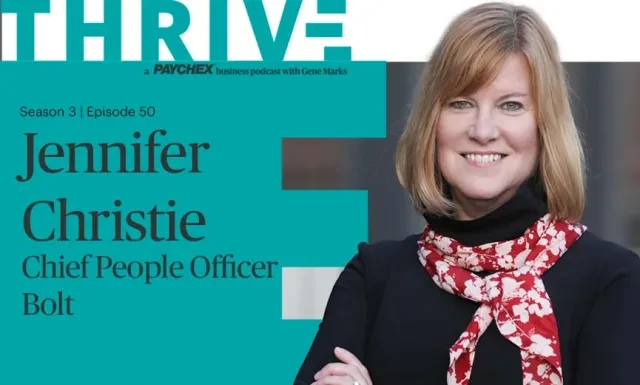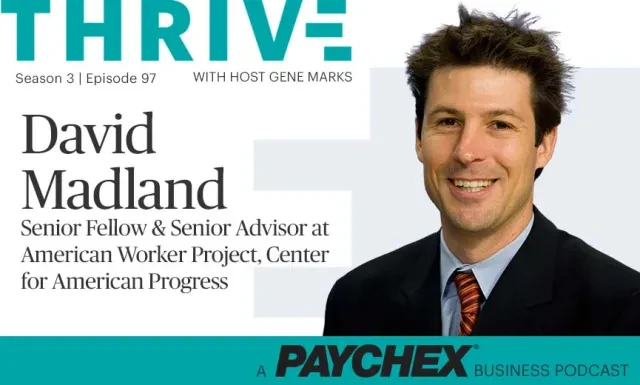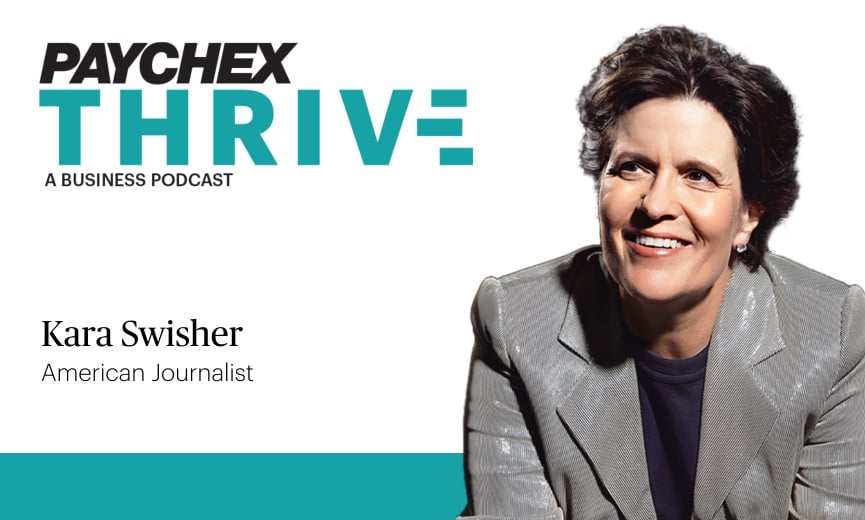Vacantes de empleo sin cubrir, el Super Bowl afecta la productividad, se podría necesitar la ayuda de Taylor Swift

Podcast •

Resumen
Parece que si las pequeñas empresas quieren librarse de la falta de productividad de sus empleados después del Super Bowl o combatir algunas malas cifras comunicadas recientemente (el 39 % de los propietarios tiene vacantes de empleo y el 14 % afirma que no contratará durante el próximo trimestre), deberían asegurarse de conectarse con el cohete económico de Taylor Swift. Gene Marks comparte detalles sobre un informe reciente de empleos, así como el impacto financiero de todo lo relacionado con T. Swift. Escuche el pódcast.
Ver transcripción
[Gene Marks, host]
Hey, everybody, it's Gene Marks, and welcome to another addition of the Paychex THRIVE Week in Review podcast. This is where we take certain news items from the previous week that impact your small business and we talk a little bit about the impact and what you need to know. So, let's talk about that right now. There are a couple of items I think are of interest to us.
The first comes from the National Federation of Independent Businesses. This is reported by ASBN.com. They issued their monthly jobs report for the previous month of January, and they found out that only 14 percent of small-business owners intend to hire new employees over the next three months. This marks the lowest level since May 2020 and a decrease of 2 percentage points from December.
That is kind of concerning. In the current quarter, 39% of all owners reported having vacant job positions, which represents the lowest reading since January 2021, and a decrease of 1 point from December. Labor quality also remains the top operating issue for small-business owners – 21% said that was the case. Labor expenses were recognized as the most difficult, critical difficulty for business owners. That increased by 1 point to 10%.
In January, 55% of business owners reported employing or attempting to hire the same as in December. Of those looking to fill positions, 89% stated they had few or no qualified applicants. Additionally, 26% of owners reported receiving few or no qualified applications for available roles, while 23% reported none at all.
What's the takeaway from all of this? Well, first of all, it's clear that small businesses are slowing down in their hiring, and that combined with lots of layoffs being done at the corporate level, does not bode well for unemployment over the coming months. I do expect to see that rate start to increase and less jobs created over the next few months because of that. And I guess it's just indicative of a slowing economy and the high cost of capital.
Finding labor continues to be a huge issue even for those that are looking for labor. And my recommendation there is to double down on referrals from your existing employees. It always tends to be the number one spot where you can find good people, even more so than advertising online. And then, of course, you know, worker quality and skills is also a big deal.
So, you know, my advice to you there, as well, is look into your state's workforce development grants. I did a big piece on this for the Philly Inquirer recently – I'm going to do another one for the Chicago Daily Herald – where I interviewed a bunch of Philly business owners that got grants from the state of Pennsylvania to help them with training and skills for their existing employees. Most states had some type of workforce development grant program going on, and it's an opportunity for you to get funding to help you, you know, you'll level up or increase the skill level of your employees.
So, you know, the NFIB report is saying that remains the biggest concern among – labor quality remains the biggest concern about business owners. It's a good way to address it is to get a workforce development grant and hopefully that can help you get some more skills for your employees. But labor market is definitely softening, and I think we're going to see more of that in 2024. So, buckle down; might be an opportunity to snap up a good employee.
And by the way, one final thing, my best clients, regardless of whether they're, you know, have open positions, when they find that talented person, they jump all over that talented person and hire them and they create work for them because talent is always, always hard to find. So, that's number one.
Number two story that was in the news this week, of course, has to do with the Super Bowl. This week, of course, yet another study came out from Challenger, Gray, and Christmas, which had in the past estimated that Super Bowl Monday is the least productive day of the year, totaling $6.5 billion in lost productivity.
The day after the Super Bowl finds almost a quarter of U.S. employees, some 45 million of them, say they will be less productive at work than usual. This is from HRgrapevine.com. Now, absenteeism, according to this report, cost the U.S. economy around $84 billion a year. Super Bowl flu absences are not a new phenomenon and in recent years have been calls to make Super Bowl Monday a public holiday. I don't know if that's going to happen any time soon.
But the bottom line is this: When you have a big event like the Super Bowl, you can expect your employees to be less productive the next day. And when that is the case, that obviously has an impact on your business. So, when you see big events like the Super Bowl coming in the future, you do want to prepare for that in advance, maybe alter work schedules a little bit, or just be conscious of the fact that the productivity of your employees are definitely not going to be as high as on any normal workday.
And speaking of the Super Bowl, and I can’t talk about the Super Bowl without talking about the Kansas City Chiefs number one fan, which turns out to be Taylor Swift, right? She's been attending a lot of the Chiefs game and she attended the Super Bowl game as well against the 49ers in Vegas. She did make it in time.
Taylor Swift, I just want to make sure we're all clear on the impact, whether or not you're a fan of hers or not, the impact that she has on the overall economy and small businesses. Quartz did a couple of reports on Taylor Swift that said that, you know, when she first attended a Kansas City Chiefs game, jerseys of the Kansas City Chiefs for her boyfriend, Travis Kelce, skyrocketed 400% in one day and she helped a boost viewership of the of the NFL, as well. And also, she is, you know, which contributes to your advertising revenues and more attention for the league itself.
The U.S. Travel Association estimates that Swift's arena tour last year had an economic impact of at least $10 billion. Even the movie theater chain, AMC, saw its stock jumped 10% around advanced ticket sales. I’m even give you some more numbers. Taylor Swift bonused each trucker working on her tour – about $100,000 each. She doled out another $55 million to cast and crew, which includes dancers and riggers and sound technicians. And then there were estimates that her concerts gave the U.S. economy a boost of $5.7 billion this past year, just in terms of tickets, costumes, travel, hotels, food and other ancillary spending.
The reason why I bring that up is because when you have a superstar like Taylor Swift or any celebrity, a big concert in your hometown, a big, you know, entertainment event, it really has a knock-off effect on a lot of small businesses. There are a lot of businesses in the travel industry besides hotels, but also obviously restaurants and entertainment venues and Uber drivers and all the people that support the travel industry, let alone people and firms that make costumes and provide food and other types of services around these entertainers. All of this has a big impact.
So, say what you want about Taylor Swift. Say what you want about the Kansas City Chiefs. The bottom line is that both Taylor Swift and the Chiefs have provided a huge boost to the economy this year, and many, many small businesses benefited because of that.
You have been listening to the Paychex THRIVE Week in Review, and my name is Gene Marks. Thanks so much for listening. I'll be back next week with some more tips and thoughts and actually news that impacts your business and what you want to do about that news. So, join in then. It's good speaking. We'll talk to you next week. Take care.
This podcast is property of Paychex, Inc. 2024. All rights reserved.

 Apple Podcast
Apple Podcast Spotify
Spotify iHeartRadio
iHeartRadio








